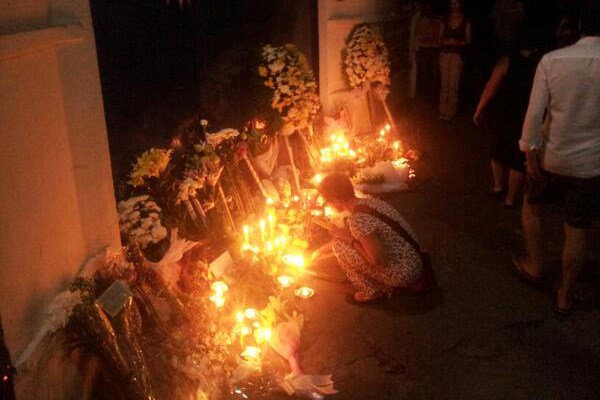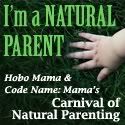Welcome to the May 2014 Carnival of Natural Parenting: Ages and Stages
This post was written for inclusion in the monthly Carnival of Natural Parenting hosted by Hobo Mama and Code Name: Mama. This month our participants have talked about their children’s most rewarding and most challenging developmental periods. Please read to the end to find a list of links to the other carnival participants.
***

Recently a child who attended our son’s playgroup was the victim of a terrible crime. It shook the expatriate community for its brutality. Cambodia’s charms draw us all in, and we foreigners choose to be hopeful about the inherent good in people. We forget that it remains a country where impunity reigns, violence lurks beneath the surface, and life can be expendable.
The mother didn’t survive the attack. Her toddler, found next to her the following morning, was airlifted to Bangkok but passed away days later. The family was posted to Cambodia less than a year ago.
Words fail for such things. It’s especially raw among those who know the weight of a baby in our arms. What profound anguish the father now bears…
At three years old, the notion of death eludes our preschooler, but he fully grasped that something tragic happened to someone he knew.
How do you begin to discuss violence with a young child who has only ever known safety, and the kindness of strangers? Especially when you just want to gather them close and shield them from something like this.
In the immediate period it’s hard not to dwell on the crime and focus on the positives.
We brought him with us to the vigil even though it ran late. He picked the flowers that we brought. He saw the family’s friends and colleagues gathered in condolence and support. He felt the shared grief and observed the basic kindness and compassion of people.
Everyone gathered in a public space then walked together in silent procession to the family’s house. Our son held a candle and some flowers and, once there, he placed them beside the others against the gate. He listened to the poems and eulogies, delivered in different languages. He asked a lot of questions quietly. And we held him close when he let us. By his innocent way he somehow helped poke through the blanket of mourning that weighed over his Papa and I.
As is normal given their resilience (or short attention span?), our son has since bounced back while we adults are left deeply impacted. He has spoken about the incident since, mostly to repeat what he already knew. And we answered as honestly as we could. There will be more questions about violence, especially with so much of it in the media (here or back home), and also as our work continues in countries where violence can be commonplace. And as this time, there won’t be an easy way to handle them. For now, we’re unconsciously smothering the kids with extra hugs and attention.
***
 Visit Hobo Mama and Code Name: Mama to find out how you can participate in the next Carnival of Natural Parenting!
Visit Hobo Mama and Code Name: Mama to find out how you can participate in the next Carnival of Natural Parenting!
Please take time to read the submissions by the other carnival participants:
- When Three-Year-Olds Stand Up For Themselves — Parenting Expert Laurie Hollman, Ph.D. at her blog, Parental Intelligence, enjoys the stage when three-year-olds dramatically wow their parents with their strong sense of self.
- This too shall pass — In the beginning, everything seems so overwhelming. Amanda at My Life in a Nutshell looks at the stages of the first 1.5 years of her daughter’s life and explains how nothing is ever static and everything changes – the good and the bad.
- Age 5 – Is It Really A Golden Period? — Jennifer at Hybrid Rasta Mama looks at the developmental norms for the five-year-old set and muses over if this age really is the ‘golden period.’
- How much do you explain to your preschooler when crime touches close to home? — When tragedy strikes someone your preschooler knows, Nathalie at Kampuchea Crossings wonders how parents can best help young children cope.
- Thoughts on Toddlerwearing — That Mama Gretchen‘s babywearing days are over, we’re living it up in the toddlerwearing days now!
- Parenting Challenges—Almost a man — Survivor at Surviving Mexico talks about leaving childhood behind as her son turns 12.
- How Child Development Works — Competence Builds Competences — Debbie at Equipped Family shares how each stage of childhood builds on the next. Focus on doing the current stage reasonably well and success will breed success!
- Making Space — Kellie at Our Mindful Life is adjusting her thinking and making room for her babies to stay near her.
- The Best Parenting Resources for Parents of Toddlers — Toddlers can be so challenging. Not only are they learning how to exert their independence, but they simply do not have the developmental ability to be calm and logical when they are frustrated. It’s the nature of the beast. I mean … the toddler. Here are Dionna at Code Name: Mama‘s favorite books and articles about parenting a toddler.
- The Fab Five Stages so Far — Laura from Pug in the Kitchen couldn’t choose just one stage for this carnival and is sharing her top five favorite stages in the young lives of her son and daughter at Natural Parents Network.
- The best parts of ages 0-6 — Lauren at Hobo Mama gives a breakdown of what to expect and what to cherish in each year.
- Lessons from Parenting a Three-Year-Old — Ana and Niko at Panda & Ananaso are quickly approaching the end of an era — toddlerhood. She shares some of her thoughts on the last two years and some tips on parenting through a time rife with change.
- Feeling Needed — Jorje of Momma Jorje ponders which developmental stage is her favorite and why. She bares it for us, seemingly without fear of judgment. You might be surprised by her answer!